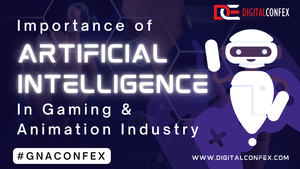Harnessing the Power of AI: Revolutionizing the Gaming and Animation Industry
Corps
Introduction
The intersection of artificial intelligence (AI) and the gaming and animation industry has reached unprecedented heights, redefining the landscape of entertainment. As we delve into the realms of the Gaming and Animation Conference 2024, held in the Amsterdam, Netherlands, it becomes evident that AI stands as a cornerstone in shaping the future of gaming and animation. In this article, we explore the profound importance of AI in these industries and how it continues to revolutionize creativity, immersion, and efficiency.
Enhancing Player Experience
One of the most notable impacts of AI in gaming is its ability to enhance the player experience. Through sophisticated algorithms and machine learning techniques, AI can create dynamic and adaptive gameplay scenarios tailored to individual preferences and skill levels. This personalization fosters deeper engagement and immersion, as players feel more connected to the game world.
For instance, AI-powered procedural generation algorithms can create vast, procedurally generated worlds in games like Minecraft or No Man’s Sky. These worlds offer virtually endless exploration opportunities, keeping players engaged for extended periods. Furthermore, AI-driven character behaviors and dialogue systems can create more realistic and lifelike interactions, elevating storytelling and character development to new heights.
Moreover, AI plays a crucial role in improving gameplay mechanics, such as enemy behavior and game balancing. By analyzing vast amounts of player data, AI can adjust difficulty levels in real-time, ensuring that the game remains challenging yet enjoyable for players of all skill levels. This adaptability contributes to a more rewarding gaming experience, keeping players invested in the long run.
Empowering Creativity in Animation
In the animation industry, AI serves as a powerful tool for unleashing creativity and streamlining production processes. From character animation to visual effects, AI-driven solutions offer unprecedented efficiency and flexibility, allowing animators to focus more on creative expression rather than tedious tasks.
One notable application of AI in animation is character animation and motion capture. Advanced AI algorithms can analyze human movements and translate them into lifelike animations with remarkable accuracy. This not only reduces the time and resources required for manual animation but also opens up new possibilities for creating expressive and believable characters.
Furthermore, AI-driven tools for procedural animation and asset generation enable animators to create vast and immersive worlds with minimal effort. These tools can automatically generate terrain, foliage, and other environmental elements based on predefined parameters, freeing up valuable time for artists to focus on refining the overall aesthetics and storytelling.
Additionally, AI-powered rendering engines can significantly accelerate the rendering process, allowing animators to visualize complex scenes in real-time with photorealistic quality. This not only reduces production time but also enables iterative refinement, empowering artists to experiment with different visual styles and effects until they achieve the desired result.
Driving Innovation and Collaboration
The Gaming and Animation Conference 2024 in the Amsterdam, Netherlands serves as a hub for innovation and collaboration, where industry professionals come together to explore the latest trends and technologies. AI plays a central role in driving this innovation, as developers and animators leverage AI-driven tools and techniques to push the boundaries of creativity and technical excellence.
Through workshops, panel discussions, and networking events, attendees have the opportunity to exchange ideas, share best practices, and forge new partnerships. AI-powered solutions, such as collaborative design platforms and content creation tools, facilitate seamless collaboration across teams and disciplines, enabling faster iteration and innovation.
Moreover, AI-driven analytics and predictive modeling tools provide valuable insights into player behavior and market trends, enabling developers and animators to make data-driven decisions throughout the production cycle. By understanding player preferences and anticipating future demands, companies can create more compelling gaming experiences and captivating animated content that resonate with their target audience.
Furthermore, AI fosters cross-disciplinary collaboration between the gaming and animation industries, leading to the exchange of ideas and technologies that benefit both fields. For example, advancements in real-time rendering and virtual production techniques pioneered by the gaming industry are increasingly being adopted in animation, allowing filmmakers to visualize complex scenes and make creative decisions on the fly.
Challenges and Ethical Considerations
While the integration of AI brings numerous benefits to the gaming and animation industries, it also poses challenges and ethical considerations that must be addressed. One of the primary concerns is the potential for algorithmic bias, where AI systems inadvertently perpetuate stereotypes or discrimination based on biased training data. To mitigate this risk, developers and animators must prioritize diversity and inclusivity in their datasets and algorithms, ensuring that AI-driven content reflects the diverse perspectives and experiences of their audience.
Additionally, the increasing reliance on AI in content creation raises questions about intellectual property rights and ownership. As AI algorithms generate increasingly complex and original content, it becomes challenging to determine the legal and moral implications of ownership. Clear guidelines and regulations are needed to establish the rights of creators and ensure fair compensation for their work, while also fostering innovation and creativity in the industry.
Conclusion
In conclusion, the importance of AI in the gaming and animation industry cannot be overstated. From enhancing player experiences to empowering creativity and driving innovation, AI has become an indispensable tool for developers and animators alike. As we navigate the evolving landscape of entertainment, events like the Gaming and Animation Conference 2024 in the Amsterdam, Netherlands serve as catalysts for collaboration and exploration, pushing the boundaries of what is possible with AI-driven technologies. By embracing AI responsibly and ethically, we can unlock new realms of creativity and storytelling that captivate audiences and inspire generations to come.













commentaires